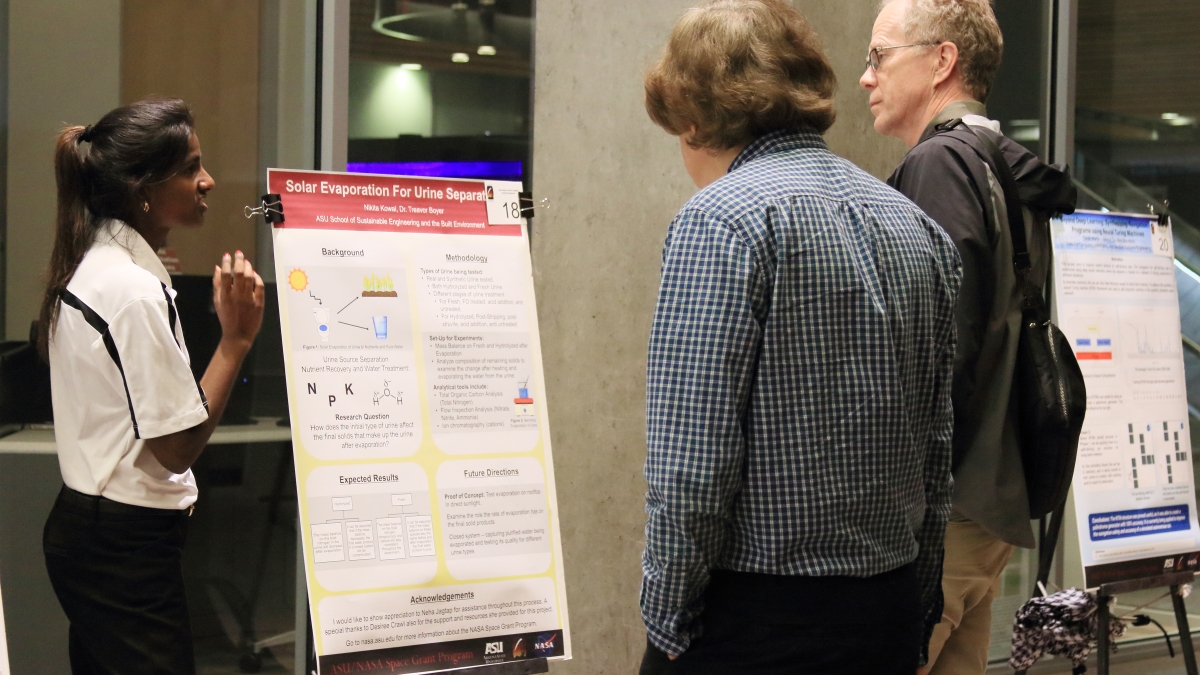NASA Space Grant scholars to hold showcase on Tempe campus

Chemical engineering major and ASU NASA Space Grant alumna Nikita Kowal at the poster session at the School of Earth and Space Exploration. Photo by ASU
Since 1988, Arizona State University has participated in the national NASA Space Grant Program that is designed to provide STEM undergraduate and graduate students with the opportunity to actively work on NASA-related research alongside a faculty mentor.
On Wednesday, Feb. 13, the 2019 space grant scholars will be showcasing their research projects at the annual NASA Space Grant Poster Session from 10 a.m. to 2 p.m. in Interdisciplinary Science and Technology Building IV on the Tempe campus. This free event is open to the public.
“Being a NASA space grant scholar provides an opportunity for undergraduates to work on real projects and gain real-world experience while they are at ASU,” said Tom Sharp, of the School of Earth and Space Exploration and director of ASU’s NASA Space Grant program.
More than 35 students will be presenting works to the public on research projects involving CubeSats, climate change, high-altitude ballooning, exoplanets, biology and geology. This year, participating students are majoring in degrees from the School of Earth and Space Exploration, the Ira A. Fulton Schools of Engineering, the School of Molecular Sciences and the Department of Physics. The showcase will also include several students from Phoenix College and Glendale Community College as guest presenters.
“The event gives the public the opportunity to see a range of projects that our students do in science and engineering,” Sharp said. “Each scholar is required to lead a project with a reportable outcome and this is their first chance to pull it together and present their findings.”
The poster session will also prepare the scholars for their next hurdle, presenting their projects at the Arizona NASA Space Grant Undergraduate Research Internship Statewide Symposium in Tempe on April 13. Since ASU is already known for its innovation ranking, these students are sure to represent their fields, and the university, with flying colors in this statewide event.
How to apply to be a NASA Space Grant Scholar or Fellow
Students interested in applying to the ASU NASA Space Grant program for the 2019–20 school year may submit an application on the NASA Space Grant website. The deadline for undergraduate and mentor applications is May 10, 2019. The deadline for graduate fellowship applications is April 24, 2019.
“For ASU students interested in becoming a NASA Space Grant Scholar, February’s poster session is a great opportunity to meet with current scholars and find out how to apply for the program,” said Desiree Crawl, senior coordinator for the program.
Up to 50 ASU students are selected each year for this prestigious program. Each scholar conducts a yearlong research program and presents the results of their research in NASA-focused fields ranging from electronics to small satellites to astrobiology.
“Our scholars work with a faculty mentor throughout their internships. This gives them opportunities, references and a distinct advantage when applying for graduate school or for positions in professional STEM fields,” Sharp said.
More Science and technology

ASU professor breeds new tomato variety, the 'Desert Dew'
In an era defined by climate volatility and resource scarcity, researchers are developing crops that can survive — and thrive —…

Science meets play: ASU researcher makes developmental science hands-on for families
On a Friday morning at the Edna Vihel Arts Center in Tempe, toddlers dip paint brushes into bright colors, decorating paper…

ASU water polo player defends the goal — and our data
Marie Rudasics is the last line of defense.Six players advance across the pool with a single objective in mind: making sure that…

